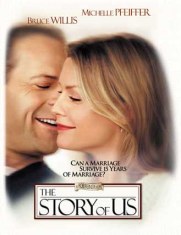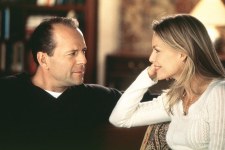Writte
 n
by Alan Zweibel & Jessie Nelson.
n
by Alan Zweibel & Jessie Nelson.Directed by Rob Reiner.
The Story of Us (1999)
Starring Bruce Willis, Michelle Pfeiffer, Tim Matheson, Rob Reiner,
Rita Wilson, Paul Reiser, Julie Hagerty, Colleen Rennison, Jake Sandvig, Jayne
Meadows, Tom Poston, Betty White, Red Buttons.
Writte n
by Alan Zweibel & Jessie Nelson.
n
by Alan Zweibel & Jessie Nelson.
Directed by Rob Reiner.
Grade: D+
Review by Dana Knowles.
The Story of Us is a film about a once-loving couple facing the sort of impasse in their 16-year marriage that seems likely to lead to a divorce. They rarely speak except to bicker or to address their children, for whom they express their parental adoration by beaming with joy throughout each encounter. Despite their deep desire to hold the family together, failure is nigh. Good actors. Plenty of star power. Potentially interesting premise. But... because Reiner & Co. attempt to assure that we'll end up relating to and liking and rooting for everybody, the final result is an astonishingly lightweight and generic film, entirely devoid of flavor. Perhaps the movie poster should have been all white with a blue strip containing the title "Story"? Somehow, I knew I was in trouble with this movie during a scene when the outgoing message on the family answering machine played, and I realized that I had no idea which name referred to which family member. Ben? Katie? Josh? Erin? Who was who? (Answer: Ben=Willis, the husband; Katie=Pfeiffer, the wife; Josh and Erin=Generic Son and Daugher of Ben and Katie.) Though Willis and Pfeiffer seem determined to inject some kind of substance or detail into their characters via their respective performances, Ben and Katie Jordan have all the subtle nuance and gravity of sock puppets. And far less charm or entertainment value. It's not the actors' fault, really. They try and try and try (sometimes visibly... a disconcerting thing to encounter with someone as talented as Pfeiffer!). But there's nothing there in the script to grab onto.
The essence of their situation is this: Katie is the overworked housewife/mother/crossword
puzzle-designer who feels that Ben doesn't appreciate how taxing her efforts
are. Ben is the fun-loving hubby/goofy dad/TV writer who feels that Katie
has lost her joie de vivre. She nit-picks about his irresponsible
disregard of everyday details, such as remembering to refill the wiper fluid
in their SUV. He moans about her refusal to ignore responsibilites and be spontaneous
from time to time. Miraculously, they're still intensely sexually attracted
to one another.  But
this seems little comfort in view of the petty squabbles that inevitably surface
and break the mood. Each has an annoying (and dreadfully unfunny) coterie
of generic friends who offer generic observations and provide generic comic
relief. The scenes where they gather with these friends are strained and
phony sitcom moments, conveying no sense of true intimacy or authentic human
interaction. Instead, they exist to allow men and women to make generic
statements about one another, none of which carries anything that could be construed
as a significant insight. At one point, Katie's friend Rachel (Rita Wilson)
points out that Katie married Ben precisely because he is like he is,
which is a valid (if generic) observation. But that's it. It's not
discussed or developed or explored, in dialogue or otherwise. It's just
a line dropped into the middle of a conversation that goes nowhere and affects
nothing. Instead, the scene apparently exists so that Rita Wilson can have
an unfunny "funny" emotional breakdown (yet another instance of an actress visibly
straining to "act" and failing, squinching up her face and voice in a vain attempt
to produce tears.... ouch!).
But
this seems little comfort in view of the petty squabbles that inevitably surface
and break the mood. Each has an annoying (and dreadfully unfunny) coterie
of generic friends who offer generic observations and provide generic comic
relief. The scenes where they gather with these friends are strained and
phony sitcom moments, conveying no sense of true intimacy or authentic human
interaction. Instead, they exist to allow men and women to make generic
statements about one another, none of which carries anything that could be construed
as a significant insight. At one point, Katie's friend Rachel (Rita Wilson)
points out that Katie married Ben precisely because he is like he is,
which is a valid (if generic) observation. But that's it. It's not
discussed or developed or explored, in dialogue or otherwise. It's just
a line dropped into the middle of a conversation that goes nowhere and affects
nothing. Instead, the scene apparently exists so that Rita Wilson can have
an unfunny "funny" emotional breakdown (yet another instance of an actress visibly
straining to "act" and failing, squinching up her face and voice in a vain attempt
to produce tears.... ouch!).
As a director, Reiner shows no flair or enthusiasm whatsoever. The sets are attractive, but unremarkable. There are many chronological shifts intended to fill in the blanks between their past and present as a couple, but they're not employed effectively or affectingly at all. (Two for the Road it's not). The score is unrelievedly cute and yucky... a rather sad fact considering that Eric Clapton is one of the collaborators. Like Nora Ephron, Reiner appears to prefer pop song exposition to character development, though in this case he eschews the endless-jukebox approach and mostly makes use of two Clapton songs, one of them popping up no fewer than three times. Apparently, that song really, really, really expresses the dynamic of this flailing relationship. Really.
It's obvious from the outset that this story will end happily, because there
is precious little conflict between the main characters. Their problems
are so simple and so superficial that the only real drama in the movie comes
from wondering when they'll see what is so painfully obvious to the rest of
us. They still love each other. They're just too defensive about past
slights to relax enough to recognize that fact. A simple apology or two
would do the trick, but that never seems to occur to either of them. There
is merit to the premise behind this film, particularly as regards the human
tendency to let small annoyances and perceived slights grow into unmanageable
problems that can destroy relationships.  The
problem is, little or none of it is developed or shown. Katie tells us
that Ben is irresponsible and ungrateful. But we don't see it. Ben
tells us that Katie has sacrificed her personality to the demands of adult responsiblity. But
we don't see it. Frankly, the scene used to introduce their youthful charms
and immediate mutual attraction is unbelievably flat and insubstantial. And
the same can be said for virtually every flashback. They add up to nothing. No
character development. No significant amusement factor. Nothing. It's
a bit baffling that any of these actors saw anything interesting in the script
in the first place.
The
problem is, little or none of it is developed or shown. Katie tells us
that Ben is irresponsible and ungrateful. But we don't see it. Ben
tells us that Katie has sacrificed her personality to the demands of adult responsiblity. But
we don't see it. Frankly, the scene used to introduce their youthful charms
and immediate mutual attraction is unbelievably flat and insubstantial. And
the same can be said for virtually every flashback. They add up to nothing. No
character development. No significant amusement factor. Nothing. It's
a bit baffling that any of these actors saw anything interesting in the script
in the first place.
The key dramatic moments are handled in heavy-handed ways that made me squirm. Ben--frustrated by his inability to connect with Katie--gets drunk and bellows obnoxiously in a restaurant. When he recognizes how much he needs her and goes to her house to spill his guts, he discovers that she has another man there for what appears to be a "date" (he's the family orthodontist--Tim Matheson in a thankless role). Guess how that scene ends? I dare you. When the denouement arrives, it is predictable and unconvincing. Pfeiffer delivers a monologue that might play as reasonably well-conceived or moving if it weren't unsupported by the body of the film, and if it weren't for the fact that Pfeiffer can't muster the tears that Katie is supposedly straining to hold back. When all is said and done, I couldn't help wonder what the point was supposed to be. While The Story of Us isn't reprehensible or horrifically bad filmmaking (see: Rob Reiner's North), it struck me as a genuine waste of talent and film stock, and certainly as a waste of my own time. I wasn't enlightened or interested or amused or moved in any measurable way, though surely I was meant to be. Like a Nora Ephron film without the scathing wit or dramatic resonance (sarcasm intended), The Story of Us sputters and dwindles and dies at the hand of its own bland indifference to what makes people interesting in the first place. If nothing else, the film stands as proof of the limited contribution of star power to any project. When left to stand entirely on their own, even beauty and charisma cannot help but flounder. Rather like a marriage that is hollow beneath its surface. Reiner may be onto something after all....
Review © October 1999 by AboutFilm.Com
and the author.
Images © 1999 Universal Studios.
Send us a comment on this review. We'll post a link to the best comments!